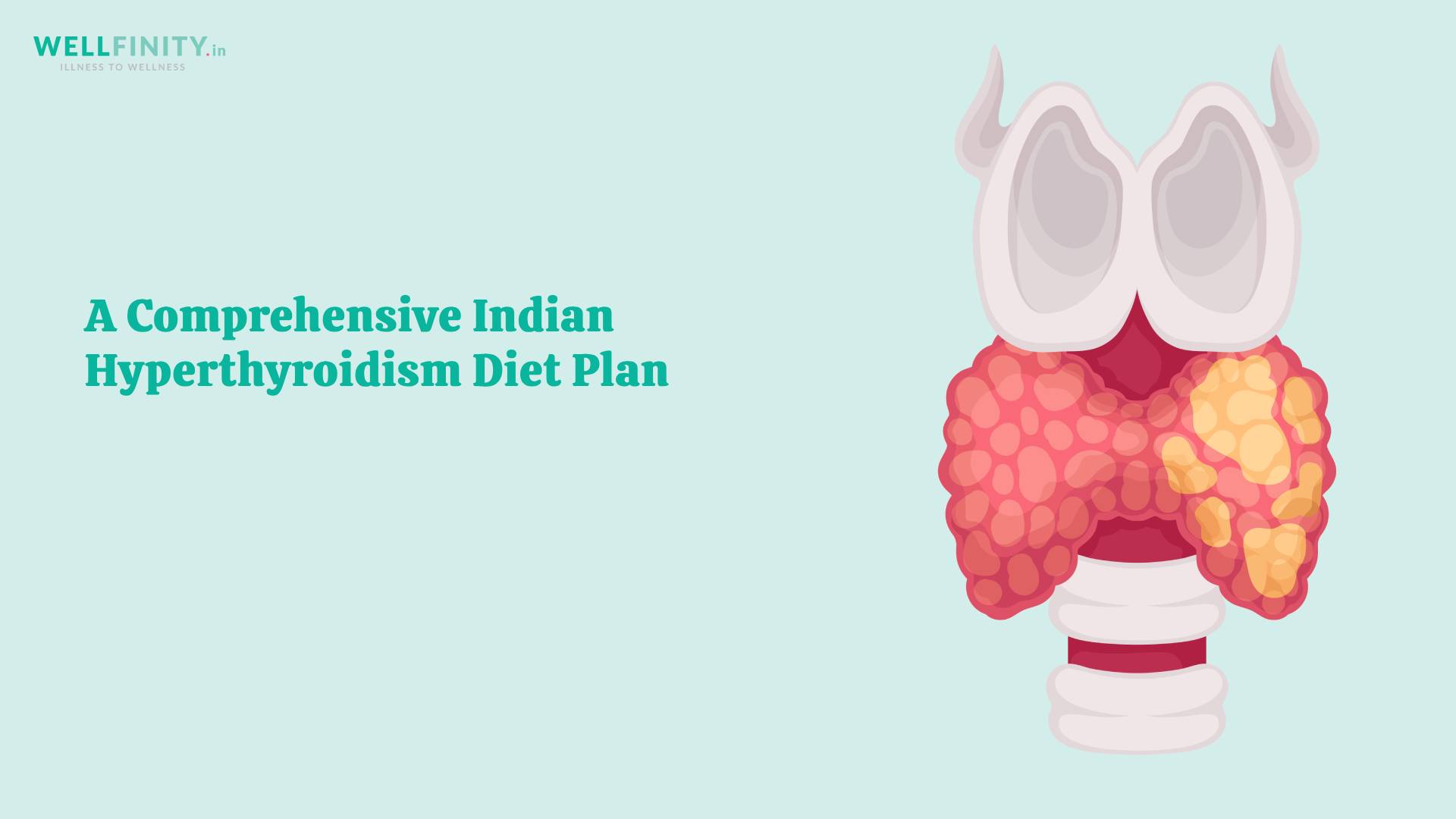Imagine waking up one day feeling unusually restless; your heart racing even when you’re sitting still. You notice your hands trembling slightly, and despite eating more than usual, you’re losing weight. This was the reality for Priya, a 32-year-old marketing professional from Mumbai, who was later diagnosed with hyperthyroidism.
Priya is only one of approximately 42 million people who struggle with this condition, where the thyroid gland goes into overdrive and produces excessive thyroid hormones, thereby disrupting metabolism.
Hyperthyroidism can feel overwhelming. But the good news is that a well-structured hyperthyroidism diet plan can help manage symptoms and improve thyroid health.
In this blog, we’ll explore how an Indian diet for hyperthyroidism, rich in local, nutrient-dense foods, can be a game-changer. From antioxidant-rich fruits to cruciferous vegetables for thyroid health, we’ll guide you through the best dietary choices and lifestyle adjustments to support your journey toward better thyroid health.
Indian Foods That Support Thyroid Health

Indian cuisine offers a treasure trove of ingredients that support thyroid health and help manage symptoms naturally. Some of these are as follows:
- Antioxidant-rich foods: Amla (Indian gooseberry), pomegranate, and leafy greens like spinach and methi (fenugreek leaves) are packed with antioxidants. These nutrients combat oxidative stress, which is often elevated in hyperthyroidism.
- Omega-3 fatty acids: Flaxseeds, walnuts, and mustard oil are excellent Indian sources of Omega-3s. These healthy fats reduce inflammation and support overall thyroid function.
- Zinc-rich foods: Zinc plays a crucial role in balancing thyroid hormones. Include pumpkin seeds, chana (chickpeas), and lentils in your diet to ensure adequate zinc intake.
- Iodine: Cruciferous vegetables like bamboo shoots, bok choy, broccoli, Brussel sprouts, Cassava, cauliflower, Cabbage, collard greens, kale, mustard and radish may stop your thyroid from using iodine properly which may be beneficial for hyperthyroidism.
- Selenium rich foods: Brazil nuts, sunflower seeds, chia seeds and mushrooms provide Selenium which helps to prevent cell damage and keep your thyroid and other tissues healthy.
These foods not only nourish your body but also help mitigate the symptoms of hyperthyroidism, such as fatigue and muscle weakness.
The Role of Cruciferous Vegetables in an Indian Diet
Cruciferous vegetables like cabbage, cauliflower, brussels sprouts, radish, broccoli, and kale are often recommended for individuals with hyperthyroidism due to their unique properties that can help manage excessive thyroid hormone production.
Cruciferous vegetables contain natural compounds called goitrogens. These compounds can interfere with the thyroid gland’s ability to use iodine, which is essential for the production of thyroid hormones (T3 and T4). In hyperthyroidism, the thyroid gland is overactive and produces too much thyroid hormone. By inhibiting iodine uptake, goitrogens can help reduce the overproduction of thyroid hormones, thereby alleviating symptoms of hyperthyroidism.
The goitrogenic compounds in cruciferous vegetables, also slow down the process of thyroid hormone synthesis. They do this by blocking thyroid peroxidase – an enzyme that is responsible for adding iodine to tyrosine (an amino acid) to form thyroid hormones. This mechanism helps to lower the levels of circulating thyroid hormones in the body.
Hyperthyroidism is often associated with inflammation and oxidative stress, which can worsen symptoms. Cruciferous vegetables are rich in antioxidants and anti-inflammatory compounds. Therefore, they reduce inflammation and mitigate some of the symptoms of hyperthyroidism such as fatigue and weakness.
The liver plays a crucial role in metabolizing and clearing excess thyroid hormones from the body. Cruciferous vegetables enhance liver function by detoxing the liver, thereby helping to regulate thyroid hormone levels.
However, it is noteworthy here that raw cruciferous vegetables have higher goitrogenic activity, which can be problematic if consumed in large quantities. Therefore, these vegetables should be consumed in moderation and should be cooked, steamed or fermented well, to reduce the goitrogenic properties.
Low-Iodine Indian Diet Choices
Iodine is a critical mineral required for the production of thyroid hormones, specifically thyroxine (T4) and triiodothyronine (T3). The thyroid gland absorbs iodine from the bloodstream. Inside the thyroid gland, iodine is combined with the amino acid tyrosine to form T4 and T3. These hormones are then released into the bloodstream to regulate metabolism, energy production, and overall body function. Without adequate iodine, the thyroid cannot produce sufficient hormones, leading to conditions like hypothyroidism or goitre (enlarged thyroid).
However, in hyperthyroidism, the opposite problem occurs. The thyroid gland is already producing an excessive amount of thyroid hormones. Adding more iodine to the system can exacerbate this overproduction, worsening symptoms such as rapid heartbeat, weight loss and anxiety. In some individuals – particularly those with pre-existing thyroid nodules or goitre – a sudden increase in iodine intake (either from supplements or iodine-rich foods) can trigger iodine-induced hyperthyroidism.
In severe cases, excessive iodine intake can lead to conditions called thyroid storm, where thyroid hormone levels spike dangerously high and cause symptoms like fever, rapid heart rate, and confusion.
Some common sources of excessive iodine in out diet are iodized salt, seafood (fish, shellfish, seaweed etc.), and processed foods. Apart from foods, supplements, cough syrups and certain other medications also contain excessive iodine.
For individuals with hyperthyroidism, a low-iodine diet is often recommended to help control symptoms and reduce thyroid hormone production. This usually includes; replacing iodized salt with non-iodized alternatives like rock salt (sendha namak) or Himalayan pink salt, avoiding sea foods, and replacing refined oil as the cooking medium with mustard or coconut oil.
It is advisable to focus on fresh fruits, vegetables, lean meats, and whole grains, as they are naturally low in iodine. Also, take due care to check food labels for iodine-containing ingredients in processed and packaged foods.
Important Indian foods for daily/weekly diet in hyperthyroidism:
- Selenium: Helps balance thyroid hormones and reduce inflammation, especially in conditions like Graves’ Disease. Eat selenium-rich foods like whole grains, sunflower seeds, and mushrooms. Try adding sunflower seeds to snacks or stir-frying mushrooms with veggies.
- Calcium: Hyperthyroidism can weaken bones. Include calcium-rich foods like ragi, sesame seeds, and leafy greens. Also, get some vitamin D from sunlight or supplements to keep bones strong.
- Protein: Muscle loss and weight loss are common. Include protein in every meal—dal, beans, paneer, chicken, or eggs. Vegetarians can have options like besan chilla with curd for breakfast.
- Portion Control & Meal Timing: Hyperthyroidism can increase hunger. Eat mindfully and control portions to manage this.
Indian Foods to Avoid
When managing hyperthyroidism, it’s crucial to be mindful of certain Indian foods that can exacerbate symptoms or interfere with thyroid function. Apart from the above mentioned (iodized salt, sea foods, dairy products, processed foods), one should also avoid soy-based foods – such as tofu, soy milk, and soy sauce – as soy is goitrogenic and can interfere with thyroid hormone production.
Caffeinated beverages like tea and coffee, as well as alcohol, should be limited, as they can worsen symptoms like anxiety, nervousness, and rapid heart rate. Instead, opt for soothing herbal alternatives like tulsi (holy basil) tea or jeera (cumin) water, which are not only caffeine-free but also offer additional health benefits.
Avoid ultra-processed foods like refined carbs, refined oils and excess sugar. Avoid restaurant, boxed or processed meals, and prepared sauces and marinades which may contain added iodine.
By avoiding these foods and making mindful substitutions, you can manage hyperthyroidism better, and support your thyroid health.
Weekly and Monthly Indian Diet Plan
Creating a structured weekly and monthly Indian diet plan is an effective way to manage hyperthyroidism while enjoying the rich flavours of Indian cuisine.
- Weekly plan:
For the weekly plan, start your day with nutrient-dense breakfasts like moong dal chilla (pancakes) with coriander and mint chutney or hydrolysed protein shake with nuts, flaxseeds avocado. These meals are light yet packed with essential nutrients like zinc and iron, which support thyroid health.
For lunch, opt for balanced meals such as chapati with dal (lentil curry) and steamed cabbage sabzi or bajra (pearl millet) roti with methi sabzi (fenugreek curry) and a side of curd. These combinations provide a mix of complex carbohydrates, protein, and healthy fats.
Dinner can include dishes like brown rice with palak (spinach) and mushroom curry or quinoa khichdi with cauliflower and carrots, which are easy to digest and rich in antioxidants.
- Monthly plan
For the monthly plan, focus on incorporating a variety of local, seasonal vegetables and low-iodine meals. Rotate protein sources like paneer (cottage cheese), lentils, and legumes to ensure adequate intake of essential amino acids. Include antioxidant-rich fruits such as pomegranate, guava, and oranges, alongside cruciferous vegetables like broccoli, cauliflower, and radish, which help regulate thyroid hormone production. Avoid high-iodine foods like seafood and processed snacks, and instead, prioritize whole, unprocessed ingredients.
This approach not only supports thyroid health but also ensures a diverse and enjoyable diet. By following this plan, you can create a sustainable routine that helps manage hyperthyroidism symptoms while nourishing your body with wholesome, Indian-inspired meals.
Lifestyle Adjustments for Better Thyroid Health in India
Some lifestyle changes are also needed to compliment the dietary changes for the better management of hyperthyroidism.
- Stress Reduction and Mental Health:
Stress triggers the release of cortisol, leading to imbalances in thyroid hormone production. It can also stress exacerbates symptoms like anxiety, irritability, and insomnia, which are already common in hyperthyroidism.
Practising relaxation techniques such as pranayama (breathing exercises), meditation, or mindfulness, on a daily basis can activate the parasympathetic nervous system, and thus promote a state of calm.
Specific yoga poses, can stimulate the thyroid gland and improve circulation to the area, while also calming the mind.
Establish a consistent sleep schedule. Aim for 7-8 hours of quality sleep each night. Poor sleep can worsen stress and thyroid dysfunction.
- Regular Exercise
Exercise helps in regulating metabolism, improving muscle strength, and reducing symptoms like fatigue and weight loss. However, it’s important to choose the right type and intensity of exercise, as overexertion can strain an already overactive metabolism. Walking, swimming, or cycling are gentle on the body and help improve cardiovascular health without over stimulating the thyroid. Light resistance exercises can help rebuild muscle mass, which is often lost due to hyperthyroidism. Yoga and stretching not only improve flexibility but also promote relaxation and stress relief.
- Gut Health and Digestion
Due to the gut-thyroid connection, a healthy gut is essential for managing hyperthyroidism, especially in autoimmune cases. Leaky gut syndrome (increased intestinal permeability) can trigger or worsen autoimmune responses, leading to further thyroid dysfunction. Include fermented foods like curd, idli, dosa, and homemade pickles to promote a healthy gut microbiome. Limit gluten, dairy, and processed foods, which can irritate the gut lining and worsen inflammation. Drink plenty of water and herbal teas to support digestion and detoxification.
- Sunlight Exposure and Vitamin D
Low levels of vitamin D are often linked to autoimmune thyroid conditions like Graves’ disease. Sunlight is the best natural source of vitamin D, and regular exposure can help maintain optimal levels. Spend 15-20 minutes in the sun daily, preferably in the morning or late afternoon, to avoid harsh UV rays. If sunlight exposure is limited, consider vitamin D supplementation under the guidance of a healthcare professional.
- Avoid Environmental Toxins
Environmental factors such as exposure to endocrine-disrupting chemicals (EDCs), can interfere with thyroid function. These chemicals are found in plastics, pesticides, and certain personal care products. Use glass or stainless steel containers instead of plastic for food and water storage. Choose organic produce to reduce pesticide exposure. Opt for natural personal care products free from harmful chemicals.
These adjustments, combined with a healthy diet, can significantly improve your thyroid function and quality of life.
Priya’s journey with hyperthyroidism taught her the importance of a holistic approach to health. By adopting a natural hyperthyroidism treatment plan that includes an Indian hyperthyroidism diet, she was able to manage her symptoms effectively and regain her energy.
Managing hyperthyroidism is about balance—balancing your diet, lifestyle, and stress levels. While the tips and diet plans shared here can help, it’s essential to consult a healthcare professional before making significant changes to your routine.
At Wellfinity, we believe in addressing the root causes of thyroid disorders through natural, sustainable solutions. Whether it’s through a thyroid disease diet plan or lifestyle adjustments, we’re here to support you every step of the way.
Take the first step toward better thyroid health today! Connect with us at www.Wellfinity.com for further guidance.
Hypothyroid-Friendly Weekly Meal Plan
Sunday
🍽 Breakfast: Protein shake with nuts, flaxseeds, and avocado
🍽 Lunch: Mushroom & green pea non-wheat paratha with methi sabzi & curd
🍽 Dinner: Masoor whole dal with non-wheat chapatti or chilla
🍏 Anytime Snack: Pomegranate, papaya
Monday
🍽 Breakfast: Moong dal chilla with veggies sautéed in ghee
🍽 Lunch: Chickpea curry with non-wheat chapatti mixed with fresh methi leaves
🍽 Dinner: Green mung dal with cauliflower/fish curry & boiled rice
🥥 Anytime Snack: Coconut water
Tuesday
🍽 Breakfast: Protein shake with nuts, flaxseeds, and avocado
🍽 Lunch: Steamed cabbage veggie, chana dal, and non-wheat chapatti
🍽 Dinner: Lobia curry with carrot & beetroot veggie and jeera rice
🍏 Anytime Snack: Pomegranate, papaya
Wednesday
🍽 Breakfast: Brown chana (sattu) shake with walnut, almond & ½ Brazilian nut (soaked overnight)
🍽 Lunch: Veggie quinoa pulao with lauki raita
🍽 Dinner: Moong dal or besan chilla with coriander-mint chutney & veggies
🍏 Anytime Snack: Green apple, green banana
Thursday
🍽 Breakfast: Moong dal chilla with veggies sautéed in ghee
🍽 Lunch: Methi non-wheat paratha with gourd curry
🍽 Dinner: Carrot-cauliflower-cabbage veg with millet pulao & coriander-mint chutney OR quinoa khichdi with veggies like cauliflower & carrots
🍓 Anytime Snack: Berries
Friday
🍽 Breakfast: Brown chana (sattu) shake with walnut, almond & ½ Brazilian nut (soaked overnight)
🍽 Lunch: Egg curry, chicken curry, potato & pumpkin curry with brown rice
🍽 Dinner: Millet khichdi
🍋 Anytime Snack: Lemon juice
Saturday
🍽 Breakfast: Egg-mushroom omelette OR sprouted green moong chilla with coriander-mint chutney
🍽 Lunch: Urad dal, jeera rice & dum aloo
🍽 Dinner: Buckwheat dosa with veggie sambar & chutney
🥥 Anytime Snack: Coconut water



